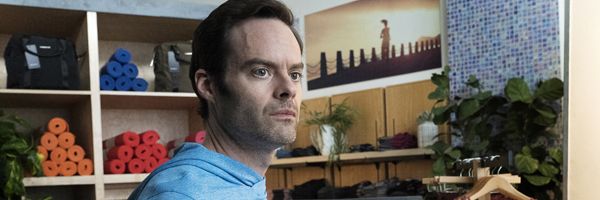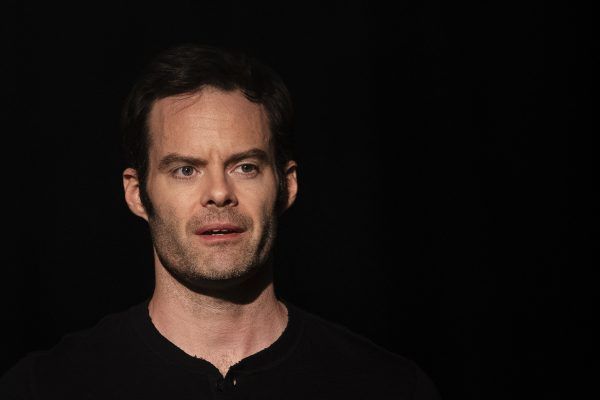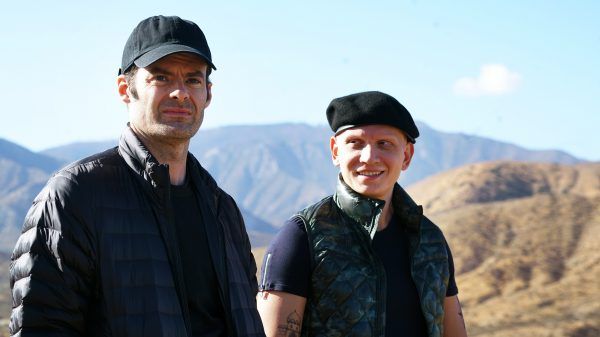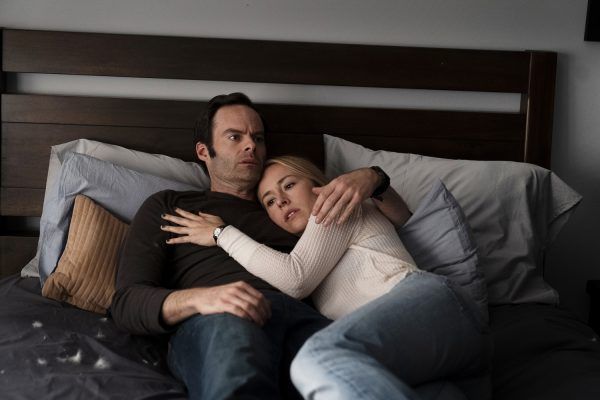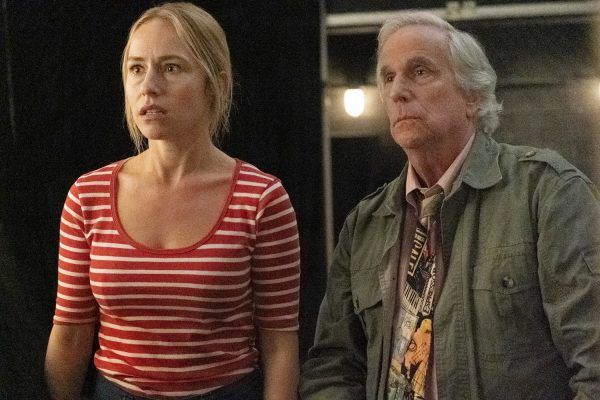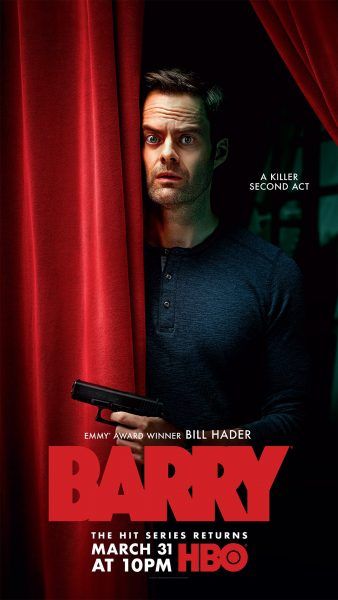Spoilers for Barry Season 2 Episode 3 follow below.
The third episode of Barry’s second season, titled “Past = Present x Future Over Yesterday”, is a big one. Over these first few episodes, we’ve watched as Barry has tried to start his life anew, leaving his assassin past behind. But in Episode 3, Barry is blocked from outrunning his past at every turn. He's being forced to dredge up a violent episode from his past in class, and while trying to write his presentation, Hank literally tries to kill him. As if that wasn’t enough, Sally wants Barry to role play as her abusive ex-husband. The walls feel like they’re crashing in on Barry to be sure, but also on all the characters as they work to hide their past and remake themselves, only to find that some things are simply inescapable.
During my exclusive interview with Hader about this episode, we dug into how that Korengal flashback sequence was crafted and how an earlier concept was thrown out in favor of simply cutting to the action. Hader also talked about how the episode explores what violence does to people, and how that has manifested in the new life that Sally has created for herself in Los Angeles.
We also more broadly discussed the Barry writers’ approach to story, and how it flies in the face of the notion that one must have meticulously plotted out every single beat in order for a season’s worth of story to be successful. Indeed, much like how the Breaking Bad writers room would write themselves into a corner, Hader says the Barry writers room tackles the story step by step and tries to rely on the cards they already have on the table rather than bringing in new cards for an easy fix. That refusal to find the easy way out, and reliance on cause and effect, is one of the reasons Barry is so compelling and emotionally satisfying.
Check out the full interview below, and check back next Sunday for another episodic breakdown with Hader.
Episode 3 feels like a big one. You have these flashbacks surrounding Korengal and just the whole way that it’s shot and the way that it's layered in throughout the episode I thought was really tremendous. It's one thing to write that, but I was wondering if you could talk about kind of the construction of that sequence and layering it through the episode so that it lands the way that it needs to.
BILL HADER: We thought it would be interesting to see Barry—like he's trying to write his truth and we see it. It starts with the idea of how we lie to ourselves and how we can tell some of our truths but not all of our truths. You tell partial truths, and so it'd be funny to illustrate that instead of, you know, just watching Barry type stuff and say it. You want to actually dramatize it.
Initially, we had this idea that I pitched where behind Barry, this screen would appear and the screen would rise as Barry's talking and the camera would push past Barry and you would be in Afghanistan. So, it's like a curtain folding behind Barry on Afghanistan. But we tried it and it did not work, it looked really silly. We then just did straight shots which Jeff Buchanan, the editor, was really happy about (laughs). He was like, “Can we just cut to it? Because this whole screen thing is kind of stupid” (laughs) So, yeah, my idea wasn't really that good. But, [director] Minkie Spiro just did a great job. The guy who plays Albert is fantastic, he's really funny. I kind of just like how shocking it is and also, I like the sound design in it.
We wanted to kind of tease out that Barry had done something really awful but we don't know what it is, and that he's trying to hide it. Then we thought, "Well, gosh, this thing's so terrible,” and then he talks to Fuches, and because Fuches says another big speech of the season that really resonates, which is that people don't want to see the truth, they just want to be entertained. Gene's on one side saying, "No, if you want to be an artist, you've got to tell the truth and be totally honest, be brutally honest." And then Fuches is going, "What? I just want to be entertained. Do you think that guy from Braveheart really said that speech? Like, no. But everyone cries when they see that speech. Give me a fucking break, come on." So, then we thought, "Oh, well, then gosh, Barry has to do to speech because he doesn't know that a lot of people have seen Braveheart because he hasn't seen a lot of movies, so he thinks he can just do Braveheart."
Yeah, I was going to ask where Braveheart came from because that's really funny.
HADER: We also just liked that as a movie that Gene chased for months. That Gene wanted to be in Braveheart (laughs) And then the idea that Cousineau is calling Barry on his shit and saying, "Well, no, you know what? You're going to have to play Sam." "What? No, I don't want to play this violent asshole," you know. This idea that everybody is trying to make him violent and he doesn't want to be that way. Now he's in the acting class, they're like, come on, come on. That's probably my favorite scene in that episode is when Sally is egging him on to be violent.
It's one of the things I really like about this show because I'm laughing about the Braveheart thing and then we get to that. It makes me really uncomfortable in a good way, like emotionally uncomfortable. Because you feel bad for Barry and you know what he's done, but you also know how this might make him feel.
HADER: Yeah. The editors and I also really love the scene on the roof with Hank dancing. When he says, "My guys sucks balls." And the guy says, "You're the king of suck balls mountain” (laughs). That line as scripted was, "My guys are shit." And the guy goes, "Well, if we're shit, then you're the king of shit mountain." And that shows what kind of great actor I think Anthony Carrigan is. Troy, the guy who plays Akhmal, he knew he had to repeat whatever he said. So on one take, he said, "My guys suck balls.” He gave Troy a really funny line because he was like, "Well, if I suck balls, then you're the king of suck balls mountain." And we all lost our minds. We all started laughing. Troy and Anthony, that's like two actors just totally listening to each other and trying to make the other person look good, you know?
Yeah, that whole sequence was really terrific, the reveal that Hank is trying to kill Barry. Because it happens really subtly with the bullets flying in.
HADER: Oh, yeah, that was very much written that way. That was one where Minkie, again, it's so hard being a director on someone else's show That was one where I was like, "Minkie, I'm sorry. I'm going to explain to you how I think this has to go because I see it very clearly in my head." And she was awesome that she relinquished that because I know other directors, when you tell them that, they're like, "Oh, I would have told you to go fuck yourself." But, yeah, I don't know, because when we wrote it, we just see it in such a specific way.
I did want to ask about Sally. Sarah's performance in this episode is really terrific and we get to see a lot more shades of Sally. I know that Barry's trauma is kind of front and center in this show, but it's kind of showing the effects of trauma on others through this exercise.
HADER: Yeah, what violence does to people. You know, it's interesting that Barry sort of perpetrates violence and he is dating this victim of violence. And, you know, you're seeing how that has affected her and how she has internalized it and how she tries to work through it, which I find interesting. Where she kind of puts this mask on of this—not saying that Sally isn't very self-involved, she is, but I think you're understanding kind of why she might have been a different person back in Missouri that's like, "I'm going to come to L.A. and I'm going to be fucking independent and strong and not let that happen to me again.”
And then you bring in Sam, her ex-husband and it just throws her for a loop. I mean, you see on her face when he shows up that she almost reverts back to probably the person she was when she was traumatized. And then, you see Barry's face who has kind of vowed to stop hurting people and all of a sudden he is confronted with this guy he probably wants to kill.
HADER: Yeah, they both revert back to their old selves, the side of themselves that they're trying to hide, upon seeing Sam. And that's the interesting thing, by him coming back, the side of themselves that they don't want to admit both come out by seeing one person, Sam, which is great. And Sarah picks up on those things. I mean, she's an incredibly smart actor and she picks up on that stuff and does it in a really sly way. For instance, you don't have to tell her, "Oh, you should play this like that." She knows. Every take she gives you like a different shade of it and that's really interesting.
How early on did you guys come up with the introduction of Sam as a character?
HADER: Well, you know, the end of last season, Sally says, "You know, I was in an abusive relationship." So, we knew we had that. And then it was kind of like, "Should he come back? Should the guy show up? I don't know." I think it was one of our writers who just said, "Sam has to come back. Are you crazy? That's a new conundrum for Barry to deal with." And, you know, Barry's whole thing is, "Don't be violent, don't be violent." It's interesting to bring a character in that, even if Barry wasn't an assassin, you would want to hurt that guy, just on a primitive level. If you love somebody and their abusive ex came back, you would want to at least not want to hang with that person, you know? And so that was interesting because it maybe connects to other people going, "Well, if I was Barry, yeah. I want to kill this guy." It's like, "But wait, what does that say about you?" You know what I mean? Well, what does that make him? What does that say about all of us?
I’m curious, did you guys have all of the scripts written when you started production or was the writing still going on?
HADER: No, no, no.
Okay. Because I keep wanting to make these parallels to Breaking Bad and there's these arguments that everything has to be planned out from the beginning or else your story is bad. But Breaking Bad, famously that writers room would introduce something and not know what it meant or how they were going to get out of it and just kind of figure it out.
HADER: Yeah, exactly, we're the same way. Just like she says she has an abusive ex and then we go, "Oh, cool, okay, so Sally has an abusive ex." Then you start writing Season 2 and you're like, "Oh, maybe that guy should come back. Well, what if that guy showed up? That would be crazy." Or, you know, I mean the tooth, Fuches’s tooth was the thing that came because our props guy was like, "Well, Fuches gets his tooth knocked out so where do you want me to put this?" And me and Alec both kind of looked at each other and we're like, "Oh, my God, that's great," because we were doing the scene of the cops cleaning up the Pazar scene, you know?
Oh, yeah.
HADER: And they were like, "Where should I put the tooth?" And we were like, "Oh, my God, they'll have Fuches’s tooth." We didn't even think about that. Certain things kind of present themselves, you know?
Well, I bring that up just to say I think the show is a good example of why you don't have to have everything planned out to tell a good story.
HADER: Yeah, Alec and I talked about this when a lot of shows sometimes will ... It's like they start out playing with four G.I. Joe's and they get into trouble and they don't know what to do with those four G.I. Joe's anymore so they bring in seven more G.I. Joe's and they bring in seven more G.I. Joe's, you know, until they have like 20 G.I.Joe's there and they bring in 10 more over here. There’s just too many things going on so then, to make it easy on themselves, they kill off half of them. You know what I mean? The rules are kind of all over the place. Whereas, Alec and I, I think we have a lot of characters but when we're setting things up, you're always wanting to make sure that you're playing with the cards that you've dealt, rather than adding any new cards. So like the book last season, Gene’s book that Ryan Madison writes in and it ends up that that was the thing that was that way, you know? Where we're kind of like, "Okay, we can't make up a new thing and that's how they figure out the connection between Taylor and Ryan Madison,” you know what I mean? It has to be a thing that we know.
If you missed our previous Season 2 episode breakdowns with Hader, click on the links below:

